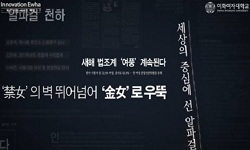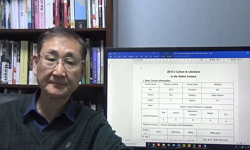This paper deals with two controversial points : “Is ``The internal progress theory`` singular as a method to study the old Korean novel?” and “What are validity and limitation of ``The internal progress theory``?” The paper intends to examine...
http://chineseinput.net/에서 pinyin(병음)방식으로 중국어를 변환할 수 있습니다.
변환된 중국어를 복사하여 사용하시면 됩니다.
- 中文 을 입력하시려면 zhongwen을 입력하시고 space를누르시면됩니다.
- 北京 을 입력하시려면 beijing을 입력하시고 space를 누르시면 됩니다.

한국 고소설 연구와 내발론, 그 갱신과 탈주 = A historical study of the old Korean novel research based on The Internal progress theory its renewal and escape
한글로보기https://www.riss.kr/link?id=A100399497
- 저자
- 발행기관
- 학술지명
- 권호사항
-
발행연도
2015
-
작성언어
-
- 주제어
-
KDC
800
-
등재정보
KCI등재
-
자료형태
학술저널
-
수록면
33-64(32쪽)
-
KCI 피인용횟수
1
- DOI식별코드
- 제공처
-
0
상세조회 -
0
다운로드
부가정보
다국어 초록 (Multilingual Abstract)
This paper deals with two controversial points : “Is ``The internal progress theory`` singular as a method to study the old Korean novel?” and “What are validity and limitation of ``The internal progress theory``?” The paper intends to examine history of the old Korean novel after 1970s through the lens of the aforementioned controversial points. Regarding the former, the paper states ``The internal progress theory`` has been renewed by identifying a novel as “a narrative of combat”, “a narrative of concreteness” and “a narrative of desire”. Therefore, the paper insists ``The internal progress theory`` should not be considered singular as a method to study the old Korean novel. The paper further mentions that the ‘renewal’ is a process of identifying problems of Modernism and escaping from it. Regarding the latter, the paper asserts that the study of the old Korean novel based on ``The internal progress theory`` has a tendency to contemplate mainly on “the problem of colonization” and “the problem of ownership”; therefore, ``The internal progress theory`` is still valid. However, its limitations are its tendency keep a distance from the problems of post-modernism such as “feminism” and “medievalism”. In summary, the paper claims that there is a common section between ‘The internal progress theory’ and ‘post-modernism’, and it is necessary to build dialogic relationship between those two when studying old Korean novel.
참고문헌 (Reference)
1 박찬승, "한국학연구 패러다임을 둘러싼 논의-내재적 발전론을 중심으로-" 한국학연구원 (35) : 73-118, 2007
2 박희병, "한국전기소설의 미학" 돌베개 1997
3 조동일, "한국소설의 이론" 지식산업사 1977
4 이영훈, "한국사에 있어서 근대로의 이행과 특질" 경제사학회 21 : 1996
5 임형택, "한국문학사의 시각" 창작과비평사 1984
6 강상순, "한국 고전문학 연구에 수용된 탈근대ㆍ탈민족 담론에 대한 비판적 고찰 - 고미숙과 강명관의 논의를 중심으로 -" 민족문화연구원 (53) : 101-155, 2010
7 김태준, "증보 조선소설사" 한길사 1990
8 Robert Hegel, "중국고전소설의 연구개황" 서울대학교 동아문화연구소 32 : 1994
9 최윤오, "조선후기 토지소유권의 발달과 지주제" 연세대 2001
10 최윤오, "조선후기 사회경제사 연구와 근대" 한국역사연구회 45 : 2002
1 박찬승, "한국학연구 패러다임을 둘러싼 논의-내재적 발전론을 중심으로-" 한국학연구원 (35) : 73-118, 2007
2 박희병, "한국전기소설의 미학" 돌베개 1997
3 조동일, "한국소설의 이론" 지식산업사 1977
4 이영훈, "한국사에 있어서 근대로의 이행과 특질" 경제사학회 21 : 1996
5 임형택, "한국문학사의 시각" 창작과비평사 1984
6 강상순, "한국 고전문학 연구에 수용된 탈근대ㆍ탈민족 담론에 대한 비판적 고찰 - 고미숙과 강명관의 논의를 중심으로 -" 민족문화연구원 (53) : 101-155, 2010
7 김태준, "증보 조선소설사" 한길사 1990
8 Robert Hegel, "중국고전소설의 연구개황" 서울대학교 동아문화연구소 32 : 1994
9 최윤오, "조선후기 토지소유권의 발달과 지주제" 연세대 2001
10 최윤오, "조선후기 사회경제사 연구와 근대" 한국역사연구회 45 : 2002
11 이세영, "조선시기 농업사 연구의 방향-최근의 조선후기 농업사 연구에 대한 논쟁을 중심으로" 한국역사연구회 1 : 1989
12 김현양, "조선 중기, ‘욕망하는 주체’의 등장과 ‘소설’의 기원" 민족문학사학회 (52) : 10-33, 2013
13 장효현, "전기소설의 연구성과와 과제" 고대민족문화연구소 28 : 1995
14 김진곤, "이야기 小說 Nonel" 예문서원 121-122, 2001
15 최윤오, "유럽중심주의 역사인식에 대한 반성과 비판" 한국학연구소 (27) : 461-502, 2012
16 조동일, "소설의 사회사 비교론 1~3" 지식산업사 2001
17 박일용, "소설사의 기점과 장르적 성격 논의의 성과와 과제" 한국고소설학회 (24) : 5-33, 2007
18 서영채, "소설과 문학사, 기원의 담론" 민족문학사학회 (53) : 255-285, 2013
19 하정일, "복수의 근대와 민족문학" 민족문학사연구소 17 : 2000
20 최원식, "동아시아 텍스트로서의 한국현대문학" 한국어문학회 (83) : 51-64, 2004
21 이홍락, "내재적 발전론 비판에 대한 반비판" 역사비평사 4 : 1997
22 김흥규, "근대의 특권화를 넘어서 : 식민지 근대성론과 내재적 발전론에 대한 이중 비판" 창비 201-222, 2013
23 김영민, "근대성과 한국학 : 한국 사상사를 중심으로" 예문 동양사상연구원 13 : 132-133, 2005
24 강명관, "국문학과 민족 그리고 근대" 소명출판 2007
25 정출헌, "고전소설 연구의 몇몇 국면에 대한 반성적 고찰" 고려대 민족문화연구원 한국문학연구소 3 : 2002
26 정출헌, "고전문학에서의 근대성 논의, 그 반성의 자리와 갱신의 계기" 국제어문학회 (35) : 97-132, 2005
27 이종필, "고소설 연구의 민족/민중/근대성 지향에 대한 비판적 성찰: 내재적 발전론과의 상관관계를 중심으로" 민족문학사학회 (48) : 6-32, 2012
28 이영호, "‘내재적 발전론’ 역사인식의 궤적과 전망" 한국사연구회 (152) : 239-272, 2011
29 김현양, "<최치원>의 장르 성격 논의에 대한 비판적 검토" 민족문학사연구소 10 : 1997
30 이하나, "1990년대 이후 한국사학계의 방법론적 모색 -쟁점ㆍ좌표ㆍ가능성에 대한 비평적 검토-" 한국철학사상연구회 22 (22): 291-347, 2011
동일학술지(권/호) 다른 논문
-
- 한국한문학회
- 박동욱 ( Dong Wuk Bak )
- 2015
- KCI등재
-
- 한국한문학회
- 이홍식 ( Hong Shik Lee )
- 2015
- KCI등재
-
『향대기람(香臺紀覽)』을 통해 본 일제시대 대만(臺灣)의 교통과 숙식 시설
- 한국한문학회
- 진경지 ( Qing Zhi Chen )
- 2015
- KCI등재
-
- 한국한문학회
- 강명관 ( Myeong Kwan Kang )
- 2015
- KCI등재
분석정보
인용정보 인용지수 설명보기
학술지 이력
| 연월일 | 이력구분 | 이력상세 | 등재구분 |
|---|---|---|---|
| 2027 | 평가예정 | 재인증평가 신청대상 (재인증) | |
| 2021-01-01 | 평가 | 등재학술지 유지 (재인증) |  |
| 2018-01-01 | 평가 | 등재학술지 유지 (등재유지) |  |
| 2017-10-30 | 학회명변경 | 영문명 : 미등록 -> Society for Korean Literature in Classical Chinese |  |
| 2017-10-12 | 학술지명변경 | 외국어명 : Journal of Korean literature in Hanmun -> Journal of Korean Literature in Classical Chinese |  |
| 2015-01-01 | 평가 | 등재학술지 유지 (등재유지) |  |
| 2011-01-01 | 평가 | 등재학술지 유지 (등재유지) |  |
| 2009-01-01 | 평가 | 등재학술지 유지 (등재유지) |  |
| 2007-01-01 | 평가 | 등재학술지 유지 (등재유지) |  |
| 2004-01-01 | 평가 | 등재학술지 선정 (등재후보2차) |  |
| 2003-01-01 | 평가 | 등재후보 1차 PASS (등재후보1차) |  |
| 2002-01-01 | 평가 | 등재후보학술지 유지 (등재후보1차) |  |
| 1999-07-01 | 평가 | 등재후보학술지 선정 (신규평가) |  |
학술지 인용정보
| 기준연도 | WOS-KCI 통합IF(2년) | KCIF(2년) | KCIF(3년) |
|---|---|---|---|
| 2016 | 0.77 | 0.77 | 0.79 |
| KCIF(4년) | KCIF(5년) | 중심성지수(3년) | 즉시성지수 |
| 0.9 | 0.86 | 1.77 | 0.28 |




 KCI
KCI KISS
KISS






